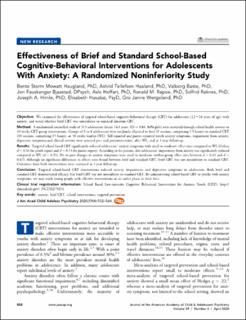Effectiveness of Brief and Standard School-Based Cognitive-Behavioral Interventions for Adolescents With Anxiety: A Randomized Noninferiority Study
Haugland, Bente Storm Mowatt; Haaland, Åshild Tellefsen; Baste, Valborg; Bjaastad, Jon Fauskanger; Hoffart, Asle; Rapee, Ronald M.; Raknes, Solfrid; Himle, Joseph A.; Husabo, Elisabeth; Wergeland, Gro Janne
Journal article, Peer reviewed
Published version

Åpne
Permanent lenke
https://hdl.handle.net/11250/2738806Utgivelsesdato
2020Metadata
Vis full innførselSamlinger
Originalversjon
Journal of the American Academy of Child and Adolescent Psychiatry. 2020, 59 (4), 552-564 10.1016/j.jaac.2019.12.003Sammendrag
Objective
We examined the effectiveness of targeted school-based cognitive-behavioral therapy (CBT) for adolescents (12−16 years of age) with anxiety, and tested whether brief CBT was noninferior to standard duration CBT.
Method
A randomized controlled study of 313 adolescents (mean 14.0 years, SD = 0.84, 84% girls) were recruited through school health services to 10 weeks CBT group interventions. Groups of 5 to 8 adolescents were randomly allocated to brief (5 sessions, comprising 5.5 hours) or standard CBT (10 sessions, comprising 15 hours), or 10 weeks waitlist (WL). Self-reported and parent-reported youth anxiety symptoms, impairment from anxiety, depressive symptoms,and clinical severity were assessed pre- and postintervention, after WL, and at 1-year follow-up.
Results
Targeted school based CBT significantly reduced adolescents’ anxiety symptoms with small to moderate effect sizes compared to WL (Cohen d = 0.34 for youth report and d = 0.53 for parent report). According to the parents, also adolescents’ impairment from anxiety was significantly reduced compared to WL (d = 0.51). Pre to post changes in anxiety symptoms were small to moderate (within-group effect sizes between d = 0.41 and d = 0.67). Although no significant differences in effects were found between brief and standard CBT, brief CBT was not noninferior to standard CBT. Outcomes from both interventions were sustained at 1-year follow-up.
Conclusion
Targeted school-based CBT interventions reduced anxiety, impairment, and depressive symptoms in adolescents. Both brief and standard CBT demonstrated efficacy, but brief CBT was not noninferior to standard CBT. By administering school-based CBT to youths with anxiety symptoms, we may reach young people with effective interventions at an earlier phase in their lives.
